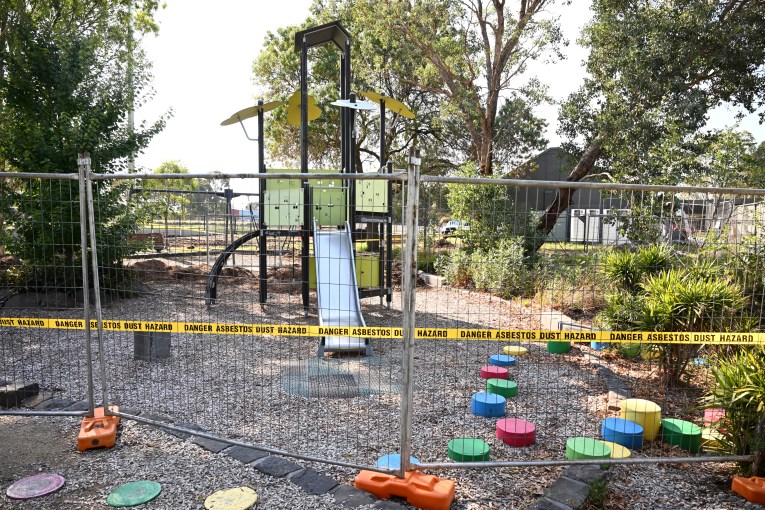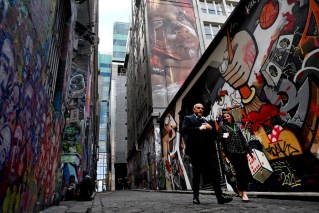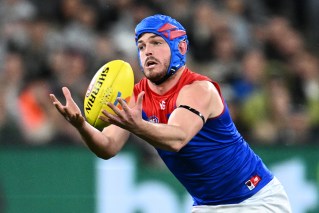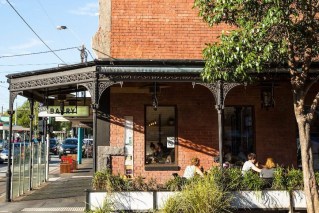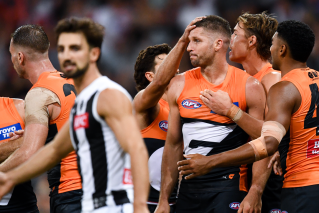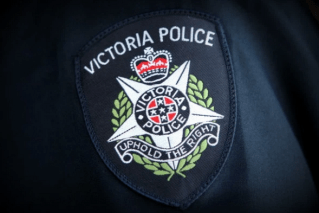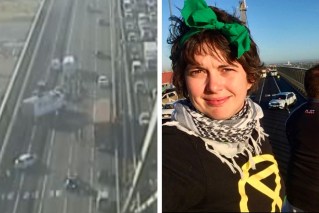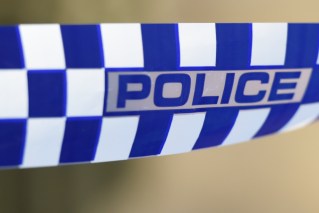No leniency: Stern warning from police for 350,000 in Melbourne lockdown

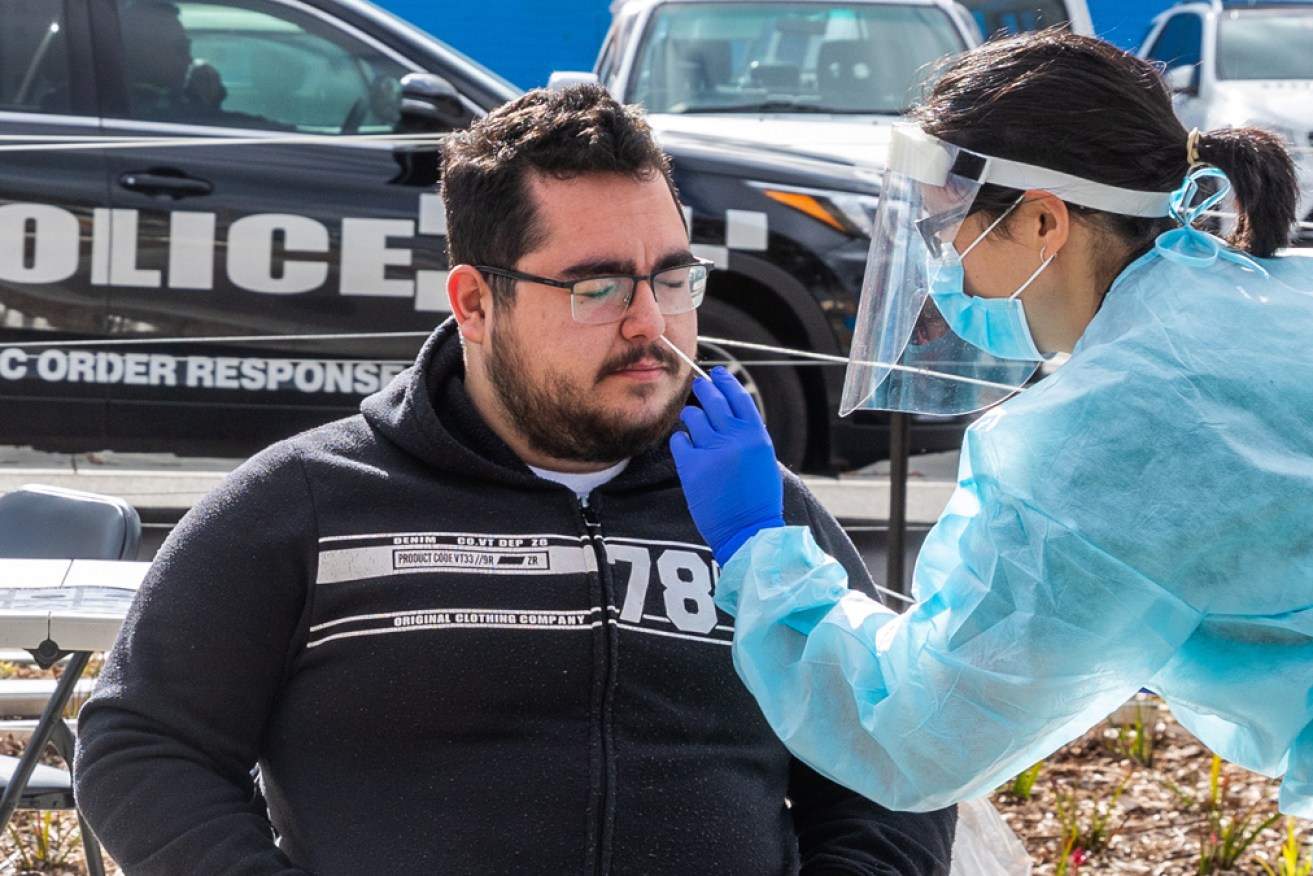
An man is tested for COVID in one of Melbourne's hotspots on Thursday. Photo: Getty
Police have flooded the streets of Melbourne’s COVID-19 hotspots to enforce the return to strict lockdowns on Thursday.
Road blocks and booze bus-style checks were set up across dozens of suburbs in Melbourne’s north and west on Thursday, as Victoria Police said the renewed restrictions would be enforced vigorously.
Tweet from @georgie_tunny
Until at least July 29, about 350,000 people living in the 10 affected postcodes are allowed to leave home only to get food, medical care, go to school or work or exercise.
“You’d have to have been on Mars not to understand that the chief health officer’s restrictions apply in these 36 suburbs and that you’re expected to adhere to them,” Commissioner Shane Patton said.
“I have instructed all of our officers that that window of leniency may exist on some very small few occasions, but other than that, people are expected to get tickets for $1652.”
Tweet from @VictoriaPolice
Victoria’s tough lockdowns and expanding COVID-19 testing program will also be enforced by Corrections Victoria staff (from prisons), Australian Defence Personnel and health workers from interstate.
Victoria reported 77 more confirmed coronavirus cases on Thursday, its highest numbers yet in the ongoing virus spike that has brought the shutdowns. It was the state’s 16th day of double-digit cases.
It now has 415 active infections. Worryingly, 20 people are in hospital with the virus, including four in intensive care – up from only two people in ICU at the start of the week.
Chief health officer Brett Sutton said Victoria’s second wave of coronavirus could kill more Australians,
“That’s absolutely a possibility when you’ve got significant transmission, when you’ve got 70-odd cases every day, there is absolutely an expectation that some of those people will die,” he said.
“That’s why it’s incumbent on all of us to be minimising our interactions with others.”

Alert texts were sent to people in the Melbourne hotspots on Thursday. Photo: Supplied
Professor Sutton said most of Thursday’s new cases were concentrated in the 10 restricted postcodes. But expanding the lockdowns to more Victorian areas remained a possibility.
“Though the stay-at-home directions apply to those restricted postcodes, all of us across Victoria have to really consider whether we need to see people in other settings, other households, including family members and friends,” he said.
“That will be the best mitigation against new postcodes being included.”
Victoria’s wave of infections has also spread outside the state, with Woolworths worker in Sydney and a returned Darwin local both confirmed with the virus. Both men had spent two weeks in hotel quarantine in Melbourne before returning home.
On Wednesday, Victorian Premier Daniel Andrews said genomic sequencing had traced a big proportion of coronavirus cases to breaches in hotels hosting returned travellers.
On Thursday, there were disturbing claims on Thursday that Victoria’s hotel quarantine arrangements have been shambolic, including that security guards slept with guests.
Companies have also charged taxpayers for shifts not worked, leading to fewer workers on duty and a higher risk of infections, according to News Ltd.
Federal Health Minister Greg Hunt urged Victorian authorities to “throw the book” at hotel coronavirus rule-breakers.
“If those claims are correct, then that is completely and utterly unacceptable,” Mr Hunt told Sky News on Thursday.
Veteran judge Jennifer Coate will lead an inquiry into the hotel quarantine program. It will report its findings by September 25.

Two of Victoria’s 87 virus clusters have emerged from quarantine hotels. Photo: AAP
Professor Sutton said he wasn’t aware of breaches from hotel workers, but hoped the inquiry would help reveal possible mistakes.
He said authorities were focusing on the virus’ transmission across communities. So far, the Victoria has had 87 cluster outbreaks.
Engagement with families in hotspots had resulted in more children being tested in recent days, revealing cases that “would otherwise have gone unnoticed”.
“I certainly feel for people, and it’s frustrating to see some areas where those restrictions aren’t in place, just across the road from where you might be,” Professor Sutton said.
“We all have to cop it on the chin. The alternative is that there’s increased transmission and that there are more and more postcodes or all of metro Melbourne or all of Victoria that goes into a shutdown.”
A planned easing on restrictions for Victoria was delayed in June, with family gatherings quoted as one of the sources of the recent spread of the virus.
Professor Sutton will also review whether students in the locked down areas can return to school when term three begins on July 13.
“I want to see both that we’re turning transmission around but also that we don’t have such levels of community transmission, with students becoming infected, that our resourcing is all focused on response to cases in schools,” he said.
-with AAP
